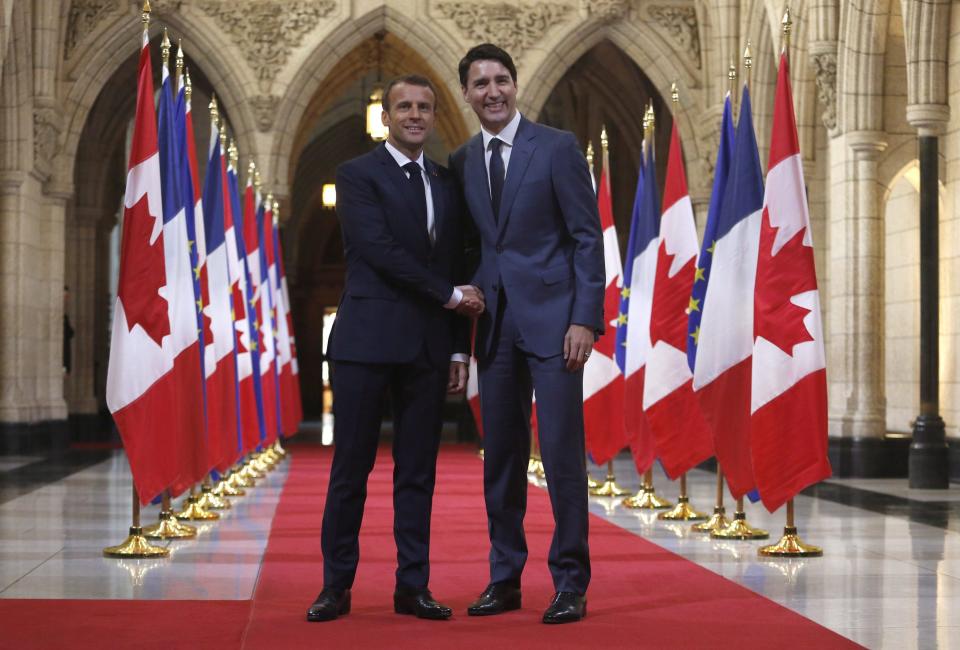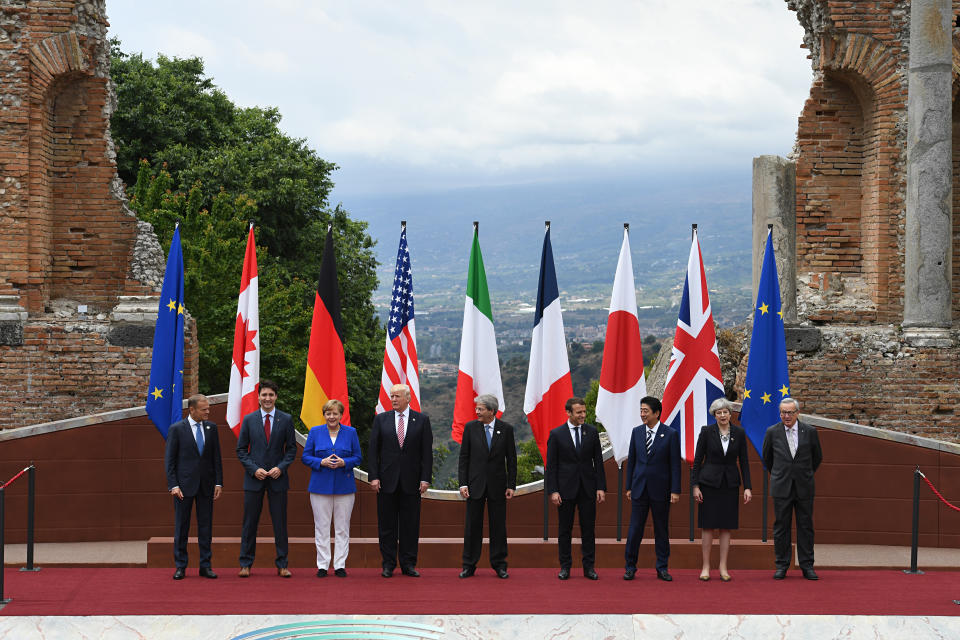UK government rejects Donald Trump's call for Russia to be reinstated into G7
The UK government has rejected Donald Trump’s claim that Russia should be reinstated into the G7.
Mr Trump had told reporters ahead of the meeting of major industrialised nations in Quebec: ‘Russia should be in the meeting, should be a part of it.’
Russia was ousted from the elite group – then known as the G8 – in 2014 as punishment for Russian president Vladimir Putin’s annexation of Crimea and its support for pro-Russian separatists in Ukraine.
However, ahead of the meeting on June 8 and 9, a UK government source said: ‘We should remind ourselves why the G8 became the G7 – it was after Russia illegally annexed Crimea.

‘Before any conversations can take place about Russia rejoining, it needs to change its approach.’
Fresh from his typically outspoken tweets against his French and Canadian counterparts, Trump’s latest remarks could cause further diplomatic tensions ahead of the annual summit.
The suspension was supported by the other members of the group, including the US, Canada, Japan and four European nations.
US special counsel Robert Mueller is investigating whether Trump associates colluded with Russia in a bid to sway the 2016 presidential election in Mr Trump’s favour.


The US President had earlier hit out at France and Canada for their criticisms of his trade policies.
The White House said Mr Trump is planning an early exit from the G7 meeting in Quebec.
His travel plans were announced after French president Emmanuel Macron and Canadian prime minister Justin Trudeau signalled they will use the event to take a stance against new US tariffs on steel and aluminium imports.
At a joint press conference, Mr Macron stressed: ‘A trade war doesn’t spare anyone. It will start first of all to hurt US workers.’
MOST POPULAR ON YAHOO NEWS UK
Texas man nearly dies after being bitten by severed head of rattlesnake he had just killed
Man on night out drowns after jumping into river to escape gang of thugs
Theresa May swerves cabinet crisis over Northern Ireland Brexit deal
The shocking moment driver avoids train by a split second during 115mph police chase
Fed-up husband tells wife it’s him or her 30 dogs – and she chose the dogs
Mr Trudeau said: ‘We are going to defend our industries and our workers.’
The Canadian leader, for his part, said Mr Trump’s action would hurt American workers as well as Canadians.
‘If I can get the president to actually realise that what he’s doing is counter-productive for his own goals as well, perhaps we can move forward in a smarter way,’ Mr Trudeau said.

As tempers frayed, Mr Trump had a ready retort, writing on Twitter: ‘Please tell Prime Minister Trudeau and President Macron that they are charging the U.S. massive tariffs and create non-monetary barriers. The EU trade surplus with the U.S. is 151 Billion (dollars), and Canada keeps our farmers and others out. Look forward to seeing them tomorrow.’
Later, Mr Trump also tweeted: ‘Prime Minister Trudeau is being so indignant, bringing up the relationship that the U.S. and Canada had over the many years and all sorts of other things…but he doesn’t bring up the fact that they charge us up to 300% on dairy – hurting our Farmers, killing our Agriculture!’
A few hours later, he added: ‘Take down your tariffs & barriers or we will more than match you!’
With a cool reception all but assured, Mr Trump has complained to aides about even having to attend the meeting, especially since his summit with Mr Kim is just days away.
This marks Mr Trump’s second G7 summit, an informal gathering that meets every year under a rotating chairmanship. The member countries are Canada, France, Italy, Japan, Germany, the US and the UK. The European Union also attends.
Mr Trump is set to hold a series of group and one-on-one meetings, including with Mr Trudeau and Mr Macron.
Under Donald Trump, the United States has abandoned its traditional role in the G7. His predecessors pressed for freer global trade and championed a trading system that required countries to follow World Trade Organisation rules. Mr Trump’s policies have been more protectionist and confrontational, driven by a perception that the US has been the victim of poorly-conceived trade deals.
Relations have hit such a low that a key question now is whether the seven countries can agree on a joint statement of priorities at the conclusion of the meeting.

 Yahoo News
Yahoo News 